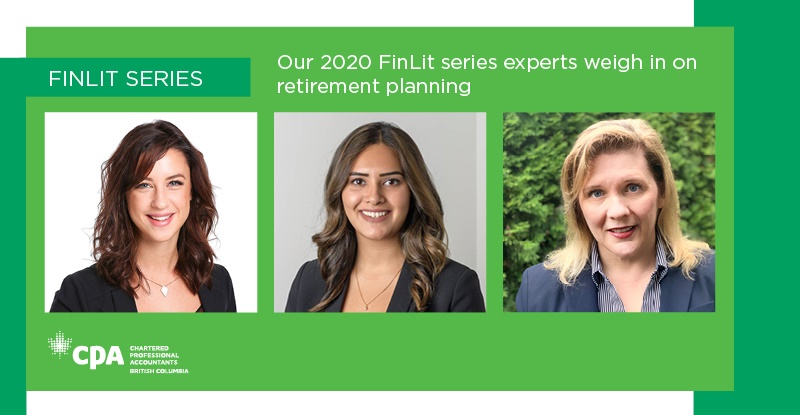
If you would like to receive a financial literacy presentation geared to retirement planning, the CPA Financial Literacy Program offers free workshops. Contact our FinLit team to receive more information on how to book a workshop.
How much of a challenge would it be for you to save $756,000? How long do you think it would take you? This amount is, on average, what Canadians believe they will need to save for a comfortable retirement. When examining this estimate by age, younger people feel they will need significantly more – Millennials surveyed believe they will need $917,000.
Everyone’s financial situation and needs are unique. However, wherever you are in life and whatever your age, financial literacy will help you reach your retirement goals. CPABC recently spoke to three Chartered Professional Accountants who volunteer with the CPA FinLit Program to get their tips to successfully plan for retirement.
Candice Hartwell, CPA, CMA: Tackle debt strategically
“Few jobs are future-proof or immune to unpredictable or ‘black swan’ events. With approximately half of Canadians living paycheque to paycheque, now more than ever we need to support each other with the resources, skills, and encouragement to understand, plan for, and navigate our personal financial situations.
When I think of planning successfully for retirement, three tips come to mind. First, automate your saving. Set up automatic deposits each paycheque – by using only the remaining cash to fund your personal budget, it's like you never had that extra money to begin with!
Second, know where your money goes. Don't just set up a budget, track your spending for a few months to see how much you actually spend (and get an idea of where you can cut back).
And finally, tackle your debt strategically. Be aggressive in paying down high-interest debt, but if you have a mortgage or other low interest, “good” debt, be strategic about it. With interest rates at historic lows, using extra savings to pay down a mortgage at a 2-3% rate may not be the best use of that cash.”
Claire Shawcross, CPA, CGA: Factor in family members
“When it comes to retirement planning, don’t assume that the government is going to take care of you, or that an inheritance is a retirement plan. If you are young, you should get into the habit of putting aside something for retirement – a dollar invested today grows exponentially between 20 and 65 and anything else is gravy. Conversely, if you are older, paying off your debts will enable you to focus on saving.
Make sure you understand how much money you will need to live on a monthly and yearly basis when you retire. Otherwise, giving up a regular weekly pay cheque can be the biggest shock. Ensure you know how to make a budget and live within it. By adjusting it regularly you can see where you are spending on needs, those items you must have (food, shelter, etc.), wants (a new car every five years) and desires (that dream vacation to Tahiti).
I would also emphasize that for many of us, it’s important to plan to take care of our parents, and to factor this into our retirement planning. Due to medical advancements, we are living longer but not necessarily healthier. Many seniors find themselves living in assisted living care facilities to help with their medical needs.
Good facilities are not cheap as they supply day-to-day care for individuals and ensure their medical well-being. The burden on the family to take care of an aged parent who is suffering from dementia is extreme, so where possible, you want to have sufficient savings in order to ensure the best professional help can be given. One way to do this is to create a separate savings account for this purpose.”
Poonam Deol, CPA: Plan for uncertainty
“It’s important to plan financially for your retirement, especially in uncertain times like these because you never know where the economy is headed. I’ll bet that five years ago, no one predicted we were going to be experiencing a global pandemic.
If you can, start saving early even if you are not contributing large amounts. Revisit your goals annually and adjust accordingly. Breathe – unexpected things can happen sometimes, for example, unexpected travel for an emergency, and it is okay. Do not beat yourself up if you get off track from your initial plan. Take a step back and revisit your plan and adjust accordingly. Your plan needs to be flexible.
You always want to build an element of uncertainty into your savings. For example, each month I expect I will incur some miscellaneous expenses that are not recurring, so I have budgeted from ‘non-recurring miscellaneous expenses.’ I would encourage you to give yourself some wiggle room when saving. It is very difficult and in my opinion to budget right down to every dollar you earn.”
CPABC offers free and unbiased financial literacy workshops – contact our FinLit team to learn more about our financial literacy presentations geared to 48 different topics, including retirement planning.
Read our full articles on Candice Hartwell, Claire Shawcross, and Poonam Deol's experiences and thoughts on the CPA Financial Literacy Program.
Leah Giesbrecht is a communications specialist with the Chartered Professional Accountants of BC.



